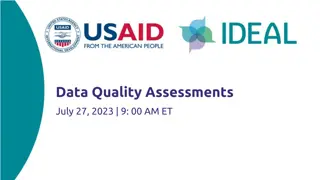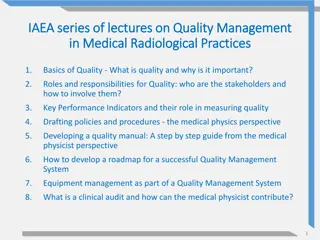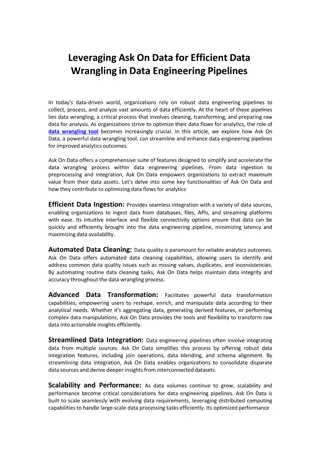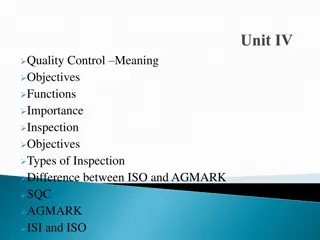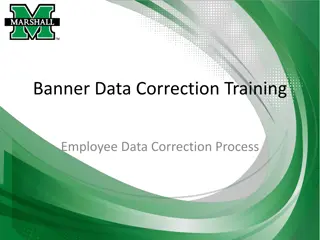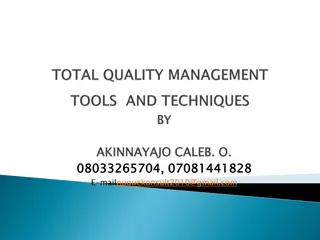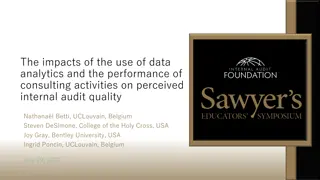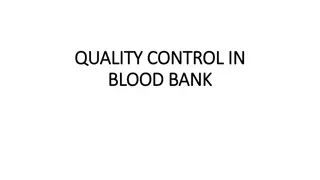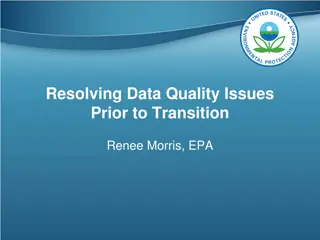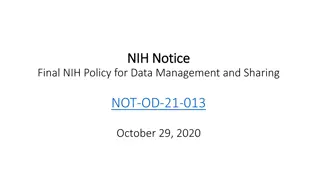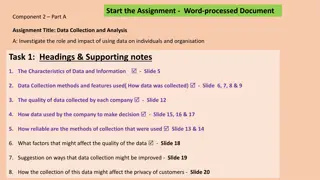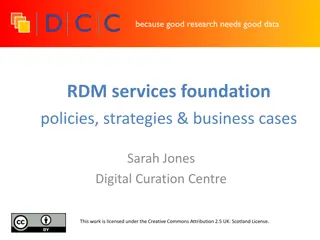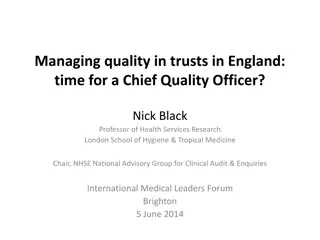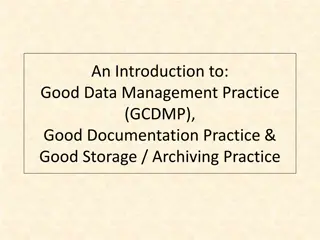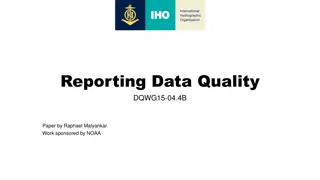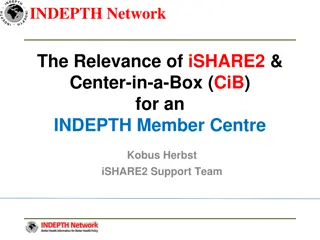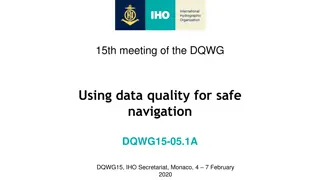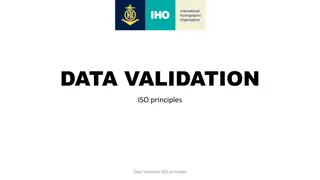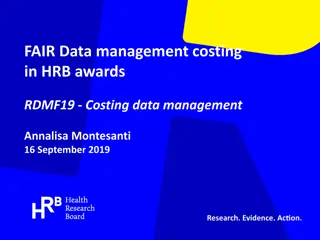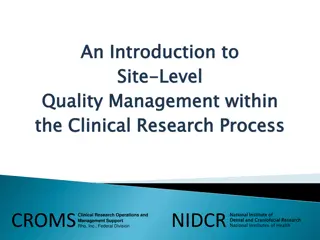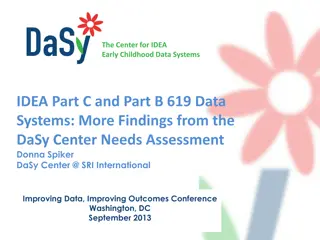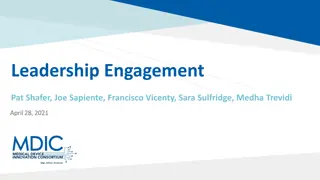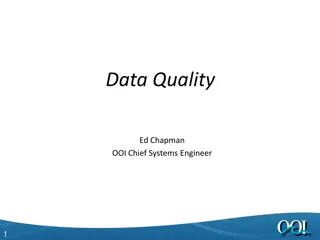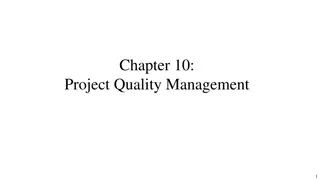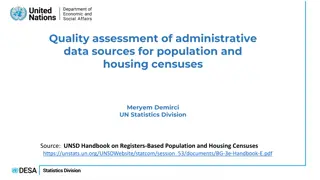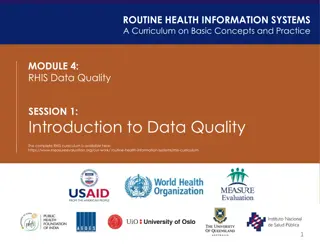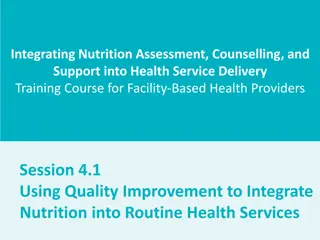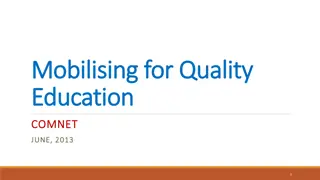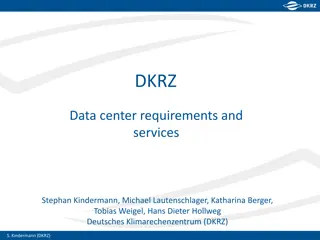Understanding Total Quality Management (TQM) Principles and Benefits
Total Quality Management (TQM) is a management philosophy focused on improving product and process quality continuously. It involves integrating tools, techniques, and training to ensure customer satisfaction. TQM emphasizes employee participation, teamwork, and enhancing working relationships to de
1 views • 13 slides
Data Quality Assessments
The International Medical Corps (IMC) introduces a new guide and tool for Research, Data Quality Assessments (RDQA) to enhance data quality practices in humanitarian settings. Led by IMC's M&E Unit, the comprehensive tool provides step-by-step instructions for assessing and scoring data quality, add
4 views • 40 slides
IAEA series of lectures on Quality Management in Medical Radiological Practices
Quality management in medical radiological practices is crucial for ensuring the delivery of high-quality healthcare services. This series of lectures covers topics such as the basics of quality, roles and responsibilities, key performance indicators, drafting policies, developing a quality manual,
4 views • 54 slides
Understanding ATIEL and European Engine Lubricants Quality Management
Introduction to ATIEL, a non-profit association representing leading European and international engine oil manufacturers. ATIEL focuses on promoting technical consensus, product stewardship, and sustainability to enhance engine oil performance. The association also delves into the development of qua
1 views • 29 slides
Ask On Data for Efficient Data Wrangling in Data Engineering
In today's data-driven world, organizations rely on robust data engineering pipelines to collect, process, and analyze vast amounts of data efficiently. At the heart of these pipelines lies data wrangling, a critical process that involves cleaning, transforming, and preparing raw data for analysis.
2 views • 2 slides
Understanding Quality Control: Meaning, Objectives, Functions, and Importance
Quality control is a crucial process where management ensures products meet predetermined standards. It involves assessing quality, locating deviations, suggesting improvements, and reducing wastage. Inspection is essential for verifying product quality and quantity. Maintenance of quality, cost red
2 views • 14 slides
Data Management Process for Ensuring Data Integrity
This presentation covers the process of data correction and management within an organization. It explains the roles and responsibilities of Data Stewards and Data Custodians in maintaining data quality, accuracy, and security. Bug-D automates processes to ensure high data integrity, with stewards r
0 views • 10 slides
Total Quality Management (TQM) in Organizations: A Comprehensive Overview
Total Quality Management (TQM) is a system approach that enhances quality and productivity in organizations through methods like CQI, SQC, QFD, QIDW, and TQC. TQM emphasizes quality, teamwork, and proactive management philosophies, aiming to continually improve products and services. Key elements in
0 views • 14 slides
Impact of Data Analytics and Consulting Activities on Internal Audit Quality
This research examines how the use of data analytics and consulting activities affect perceived internal audit quality. The study investigates the relationship between these factors and top management's perception of internal audit quality. Through online scenario-based experiments with middle and t
2 views • 11 slides
Quality Program and Process in Manufactured Construction
The module explores quality management in manufactured construction, covering concepts, history, standards, control programs, defects, and more. Emphasizing the importance of quality in the construction process, it discusses the evolution of quality in manufacturing and its application in the manufa
0 views • 40 slides
Comprehensive Overview of Quality Control in Blood Bank and Quality Assurance
In this detailed content piece, we delve into the realms of quality control and assurance in blood banks, emphasizing the crucial aspects such as quality system essentials, internal and external quality control procedures, and the significance of quality assurance in ensuring products meet required
0 views • 46 slides
Understanding Data Governance and Data Analytics in Information Management
Data Governance and Data Analytics play crucial roles in transforming data into knowledge and insights for generating positive impacts on various operational systems. They help bring together disparate datasets to glean valuable insights and wisdom to drive informed decision-making. Managing data ma
0 views • 8 slides
Resolving Data Quality Issues Prior to Transition at EPA
This content covers the process of resolving data quality issues before transitioning data at the U.S. Environmental Protection Agency (EPA). It includes information on different types of data quality checks, reviews, and corrections conducted by the EPA to ensure accurate and reliable data. The con
1 views • 9 slides
Final NIH Policy for Data Management and Sharing
This document outlines the final NIH Policy for Data Management and Sharing, emphasizing the importance of scientific data quality, validation, and replication. It clarifies that scientific data should be of sufficient quality to validate and replicate research findings, irrespective of publication
4 views • 19 slides
Continuous Monitoring of Water Quality in Little Bear River
Explore the implementation of sensors, cyberinfrastructure, and continuous monitoring networks in the Little Bear River to improve water quality predictions. Discover the challenges and solutions related to designing monitoring networks, integrating optical measurements with water quality data, and
1 views • 38 slides
Understanding Data Collection and Analysis for Businesses
Explore the impact and role of data utilization in organizations through the investigation of data collection methods, data quality, decision-making processes, reliability of collection methods, factors affecting data quality, and privacy considerations. Two scenarios are presented: data collection
1 views • 24 slides
Essential Considerations for Implementing Research Data Management Services
Research data management services are vital for facilitating good research practices. This includes developing RDM policies, strategies, and business cases, along with providing necessary services such as data management planning, active data management, preservation, and training. Starting with a c
0 views • 26 slides
Understanding Quality of Life and Its Impact on Society
Quality of life is not just a concept but a way of living that influences our judgments, standards, and priorities. Quotes from notable figures emphasize the importance of setting high standards and valuing quality in all aspects of life. The discussion delves into different perspectives on quality
0 views • 16 slides
Enhancing Audit Quality and Impact with ISSAI 140
Importance of audit quality for credibility, stakeholder confidence, and overall impact. Objective of SAIs to implement quality management system like ISSAI 140. Steps to implement ISSAI 140, organizational requirements, risk assessment, governance, and leadership responsibilities. Overview of quali
0 views • 12 slides
The Importance of a Chief Quality Officer in Healthcare Trusts
The need for a Chief Quality Officer (CQO) in healthcare trusts in England is emphasized due to the complexities of managing quality, the significance of quality alongside finance, and the call for a new approach to address quality issues. The CQO plays a crucial role in overseeing and improving qua
0 views • 11 slides
Importance of Good Data Management Practices in Clinical Research
Learn about Good Data Management Practice (GCDMP), Good Documentation Practice, and Good Storage & Archiving Practice in clinical research. Understand the significance of data, key data collection processes, best practices for reporting data in CRF, importance of documentation, and data storage/arch
0 views • 40 slides
Data Quality Reporting in Distribution Chain
Data Quality Reporting in the distribution chain is crucial for evaluating and ensuring the quality of exchanged data sets. This paper by Raphael Malyankar sponsored by NOAA discusses the importance of reporting data quality results, the stages in the production/distribution chain where reporting is
0 views • 15 slides
Enhancing Data Management in INDEPTH Network with iSHARE2 & CiB
INDEPTH Network emphasizes the importance of iSHARE2 & CiB to enhance data sharing and management among member centers. iSHARE2 aims to streamline data provision in a standardized manner, while CiB provides a comprehensive data management solution. The objectives of iSHARE2 include facilitating data
0 views • 17 slides
Enhancing Safety in Navigation Through Improved Data Quality Visualization
The IHO Data Quality Working Group focuses on classifying and depicting the quality of digital hydrographic information to ensure safe navigation. The group addresses the need for clear warnings on ECDIS displays regarding poor-quality survey data. Despite progress in developing visualization method
0 views • 34 slides
Principles of Data Validation and Quality Evaluation According to ISO Standards
Explore the key principles of data validation and quality evaluation as outlined by ISO standards. The content covers the importance of logical consistency, format consistency, and the ordering of data quality evaluation process. It delves into the assessment of data completeness, accuracy, and suit
0 views • 26 slides
Importance of Quality Assurance Programmes in Population Censuses
Quality assurance programmes play a crucial role in ensuring the accuracy and reliability of census data. These programmes help in identifying and rectifying errors at various stages of the census process, ultimately leading to high-quality outcomes that are valuable for data users. Emphasizing on t
0 views • 26 slides
Managing Data Costs and FAIR Data Practices in Research Awards
This document discusses the costing and management of research data in HRB awards, highlighting the importance of FAIR data principles. It covers responsibilities, budgeting for data management, eligible costs, and the process from application to post-award management. Key activities involve liaisin
0 views • 10 slides
Introduction to Site Quality Management in Clinical Research
The process of establishing and ensuring quality in clinical research involves Quality Management (QM) at various levels, including sponsor, monitoring, study, and site levels. This presentation clarifies QM at the site level, its documentation, processes, and tools available for support. QM activit
0 views • 18 slides
Early Childhood Data Systems Governance and Data Quality Assessment
This content highlights the importance of data governance in early childhood data systems, focusing on Part C and Part B 619 data systems. It discusses the findings from the DaSy Center needs assessment, covering topics such as data governance, data quality, and procedures for ensuring accurate and
0 views • 23 slides
Leadership Engagement for Quality Transformation in Medical Device Companies
Move from a culture of compliance to quality by influencing CEOs and key leaders, prioritizing quality over cost, and engaging employees. The mission is to promote quality as a strategic priority through strong leadership and alignment. Strategies include identifying and rationalizing cultural pract
0 views • 9 slides
Data Quality Protocols and Procedures for Instrument Calibration and Sampling Rate Management
This document outlines the data quality protocols and procedures recommended for instrument calibration, automated quality control thresholds, and flagging, as well as sampling rate strategy development and management for oceanographic instruments both shoreside and at-sea. It covers pre-deployment
0 views • 23 slides
Understanding Project Quality Management
Project Quality Management involves processes such as quality planning, assurance, and control to ensure that a project meets the relevant quality standards. It encompasses activities like identifying quality standards, evaluating project performance, and monitoring results to improve overall qualit
0 views • 65 slides
Quality Assessment of Administrative Data Sources for Population and Housing Censuses
Quality assessment and management play a crucial role in census operations, regardless of the methodology used. This involves assessing the quality of input data, process quality, and output quality, impacting decision-making on data integration, statistical results dissemination, and the need for f
0 views • 16 slides
Quality Standards and Total Quality Management at Haribo
Quality is a crucial management objective at Haribo to ensure products meet customer expectations. Steps to maintain quality include following quality standards like BS 7850-1 and ISO 8402, implementing Total Quality Management principles, and aiming for zero defects through benchmarking and employe
0 views • 9 slides
Overview of Belgian Cancer Registry and Research Initiatives
Belgium's national cancer registry, established in 2004, covers a population of 11 million with data available since 2004. The registry includes specific legislation and authorization for data use, ensuring quality data collection and longitudinal follow-up. Various data sources feed into the regist
1 views • 13 slides
Quality Assurance/Quality Control of Real-Time Oceanographic Data: Five-Year Plan Update 2022-2026
Update on the Quality Assurance/Quality Control plan for real-time oceanographic data, presented by Mark Bushnell at the US IOOS/QARTOD DMAC Annual Meeting in June 2022. The presentation covers the focus on real-time quality control manuals, the Seven Laws of QARTOD established in 2003, and the invo
0 views • 15 slides
Understanding Data Quality in Routine Health Information Systems
Data quality in routine health information systems is crucial for accurate decision-making and planning. This module covers the conceptual framework, dimensions, and metrics of data quality, along with common threats and types of data quality problems. High-quality data enable accurate assessment of
0 views • 15 slides
Integrating Nutrition Assessment and Counseling: Quality Improvement in Health Services
This training course focuses on integrating nutrition assessment, counseling, and support into routine health services using quality improvement methods. Participants will learn to explain the concept of quality improvement, develop a plan for integrating nutrition services, and understand key princ
0 views • 32 slides
Mobilising for Quality Education: A Global Initiative for Ensuring Quality Teaching and Learning
Mobilising for Quality Education is an international initiative that emphasizes the importance of quality education for individual development and societal progress. The initiative focuses on three pillars of quality education: quality teaching, tools for teaching and learning, and environments for
0 views • 13 slides
DKRZ Data Center Overview: Services and Infrastructure Updates
DKRZ is updating its data infrastructure hosting environment to enhance services like data life cycle management, quality assurance, and CMIP6 support. The data center is undergoing migration to integrate HPC and data systems, establishing a national MIP data analysis cache and cloud. Long-term arch
0 views • 13 slides

